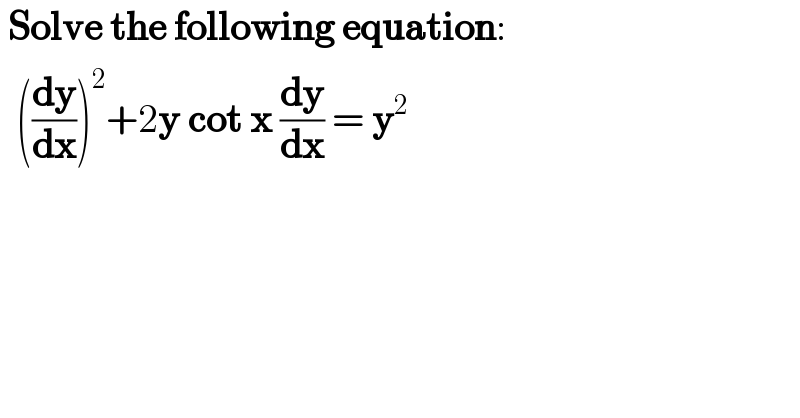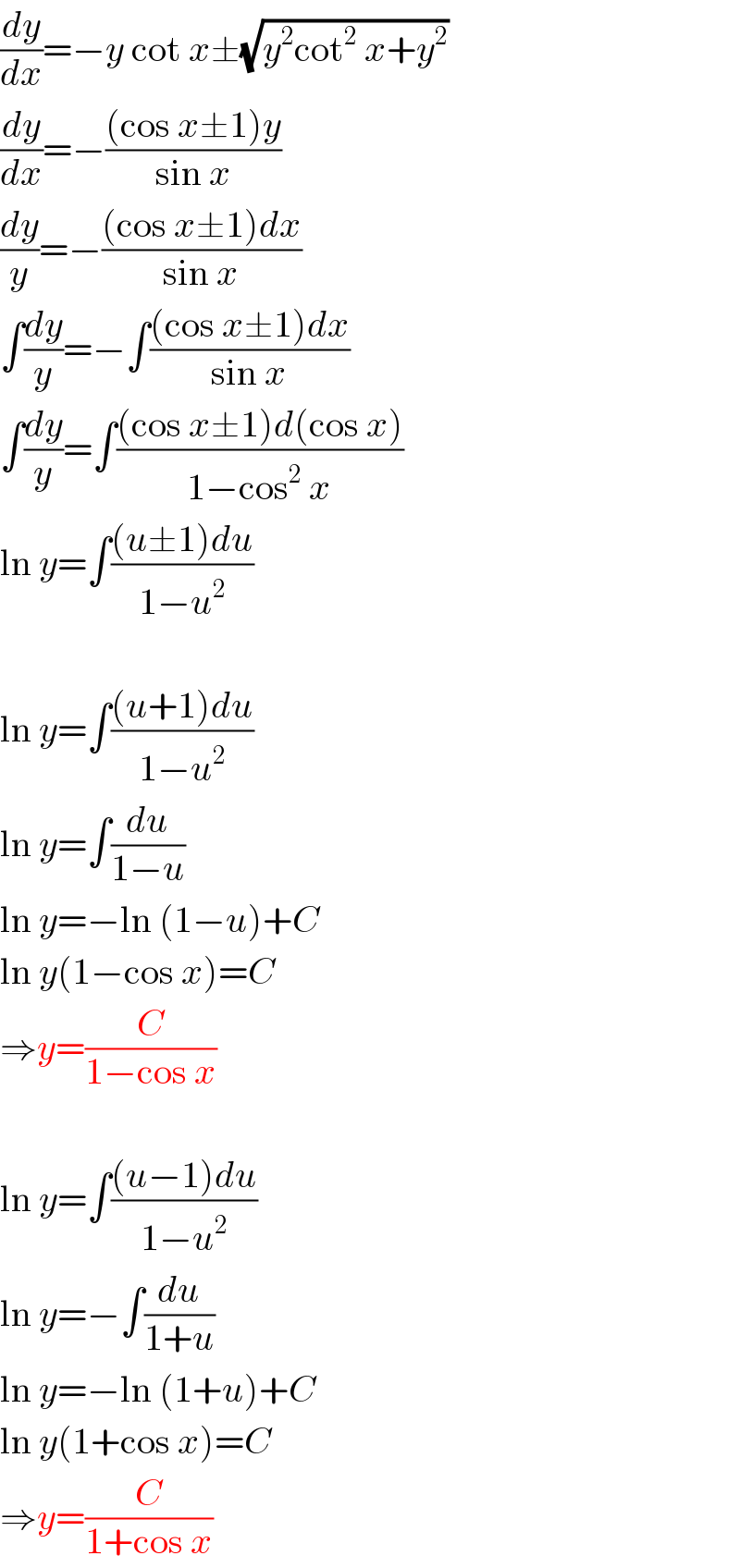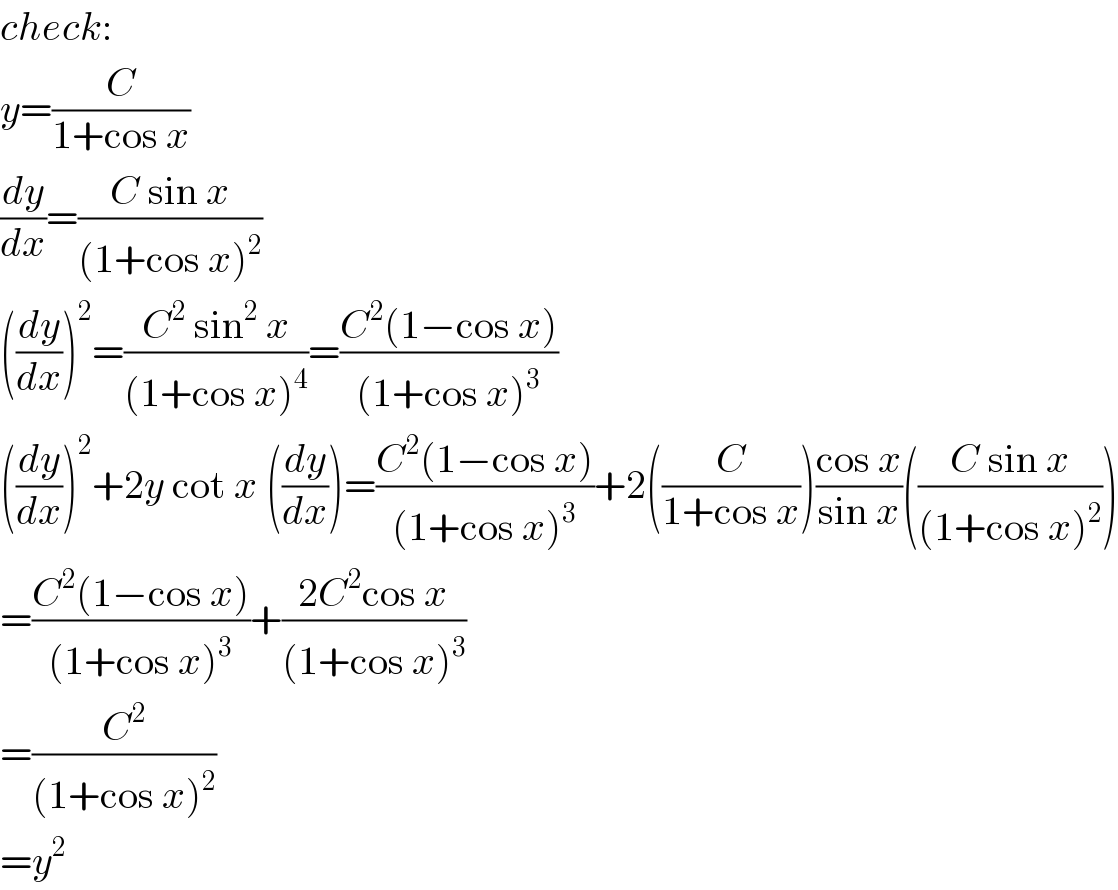
Question Number 85513 by niroj last updated on 22/Mar/20

$$\:\boldsymbol{\mathrm{Solve}}\:\boldsymbol{\mathrm{the}}\:\boldsymbol{\mathrm{following}}\:\boldsymbol{\mathrm{equation}}: \\ $$$$\:\:\left(\frac{\boldsymbol{\mathrm{dy}}}{\boldsymbol{\mathrm{dx}}}\right)^{\mathrm{2}} +\mathrm{2}\boldsymbol{\mathrm{y}}\:\boldsymbol{\mathrm{cot}}\:\boldsymbol{\mathrm{x}}\:\frac{\boldsymbol{\mathrm{dy}}}{\boldsymbol{\mathrm{dx}}}\:=\:\boldsymbol{\mathrm{y}}^{\mathrm{2}} \\ $$
Answered by mr W last updated on 22/Mar/20

$$\frac{{dy}}{{dx}}=−{y}\:\mathrm{cot}\:{x}\pm\sqrt{{y}^{\mathrm{2}} \mathrm{cot}^{\mathrm{2}} \:{x}+{y}^{\mathrm{2}} } \\ $$$$\frac{{dy}}{{dx}}=−\frac{\left(\mathrm{cos}\:{x}\pm\mathrm{1}\right){y}}{\mathrm{sin}\:{x}} \\ $$$$\frac{{dy}}{{y}}=−\frac{\left(\mathrm{cos}\:{x}\pm\mathrm{1}\right){dx}}{\mathrm{sin}\:{x}} \\ $$$$\int\frac{{dy}}{{y}}=−\int\frac{\left(\mathrm{cos}\:{x}\pm\mathrm{1}\right){dx}}{\mathrm{sin}\:{x}} \\ $$$$\int\frac{{dy}}{{y}}=\int\frac{\left(\mathrm{cos}\:{x}\pm\mathrm{1}\right){d}\left(\mathrm{cos}\:{x}\right)}{\mathrm{1}−\mathrm{cos}^{\mathrm{2}} \:{x}} \\ $$$$\mathrm{ln}\:{y}=\int\frac{\left({u}\pm\mathrm{1}\right){du}}{\mathrm{1}−{u}^{\mathrm{2}} } \\ $$$$ \\ $$$$\mathrm{ln}\:{y}=\int\frac{\left({u}+\mathrm{1}\right){du}}{\mathrm{1}−{u}^{\mathrm{2}} } \\ $$$$\mathrm{ln}\:{y}=\int\frac{{du}}{\mathrm{1}−{u}} \\ $$$$\mathrm{ln}\:{y}=−\mathrm{ln}\:\left(\mathrm{1}−{u}\right)+{C} \\ $$$$\mathrm{ln}\:{y}\left(\mathrm{1}−\mathrm{cos}\:{x}\right)={C} \\ $$$$\Rightarrow{y}=\frac{{C}}{\mathrm{1}−\mathrm{cos}\:{x}} \\ $$$$ \\ $$$$\mathrm{ln}\:{y}=\int\frac{\left({u}−\mathrm{1}\right){du}}{\mathrm{1}−{u}^{\mathrm{2}} } \\ $$$$\mathrm{ln}\:{y}=−\int\frac{{du}}{\mathrm{1}+{u}} \\ $$$$\mathrm{ln}\:{y}=−\mathrm{ln}\:\left(\mathrm{1}+{u}\right)+{C} \\ $$$$\mathrm{ln}\:{y}\left(\mathrm{1}+\mathrm{cos}\:{x}\right)={C} \\ $$$$\Rightarrow{y}=\frac{{C}}{\mathrm{1}+\mathrm{cos}\:{x}} \\ $$
Commented by mr W last updated on 22/Mar/20

$${check}: \\ $$$${y}=\frac{{C}}{\mathrm{1}+\mathrm{cos}\:{x}} \\ $$$$\frac{{dy}}{{dx}}=\frac{{C}\:\mathrm{sin}\:{x}}{\left(\mathrm{1}+\mathrm{cos}\:{x}\right)^{\mathrm{2}} } \\ $$$$\left(\frac{{dy}}{{dx}}\right)^{\mathrm{2}} =\frac{{C}^{\mathrm{2}} \:\mathrm{sin}^{\mathrm{2}} \:{x}}{\left(\mathrm{1}+\mathrm{cos}\:{x}\right)^{\mathrm{4}} }=\frac{{C}^{\mathrm{2}} \left(\mathrm{1}−\mathrm{cos}\:{x}\right)}{\left(\mathrm{1}+\mathrm{cos}\:{x}\right)^{\mathrm{3}} } \\ $$$$\left(\frac{{dy}}{{dx}}\right)^{\mathrm{2}} +\mathrm{2}{y}\:\mathrm{cot}\:{x}\:\left(\frac{{dy}}{{dx}}\right)=\frac{{C}^{\mathrm{2}} \left(\mathrm{1}−\mathrm{cos}\:{x}\right)}{\left(\mathrm{1}+\mathrm{cos}\:{x}\right)^{\mathrm{3}} }+\mathrm{2}\left(\frac{{C}}{\mathrm{1}+\mathrm{cos}\:{x}}\right)\frac{\mathrm{cos}\:{x}}{\mathrm{sin}\:{x}}\left(\frac{{C}\:\mathrm{sin}\:{x}}{\left(\mathrm{1}+\mathrm{cos}\:{x}\right)^{\mathrm{2}} }\right) \\ $$$$=\frac{{C}^{\mathrm{2}} \left(\mathrm{1}−\mathrm{cos}\:{x}\right)}{\left(\mathrm{1}+\mathrm{cos}\:{x}\right)^{\mathrm{3}} }+\frac{\mathrm{2}{C}^{\mathrm{2}} \mathrm{cos}\:{x}}{\left(\mathrm{1}+\mathrm{cos}\:{x}\right)^{\mathrm{3}} } \\ $$$$=\frac{{C}^{\mathrm{2}} }{\left(\mathrm{1}+\mathrm{cos}\:{x}\right)^{\mathrm{2}} } \\ $$$$={y}^{\mathrm{2}} \\ $$
Commented by niroj last updated on 22/Mar/20

$$\:\mathrm{thank}\:\mathrm{you}\:\mathrm{mr}.\mathrm{w}\:{nice}\:{solution}. \\ $$
